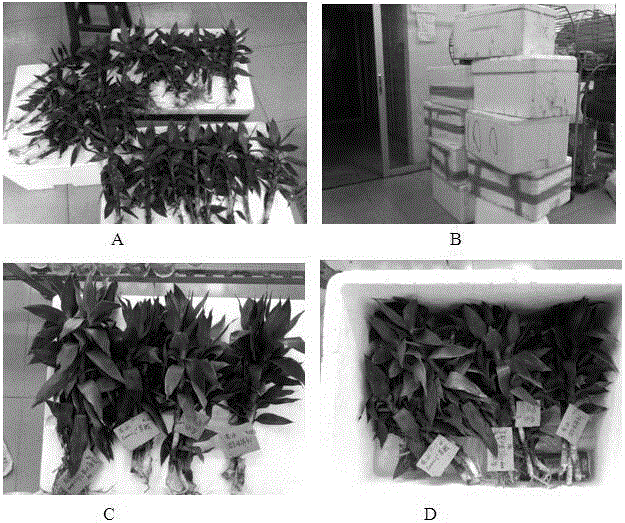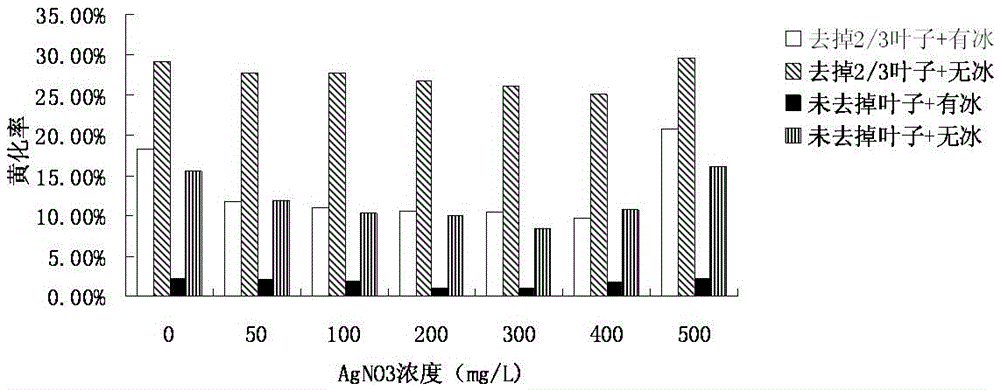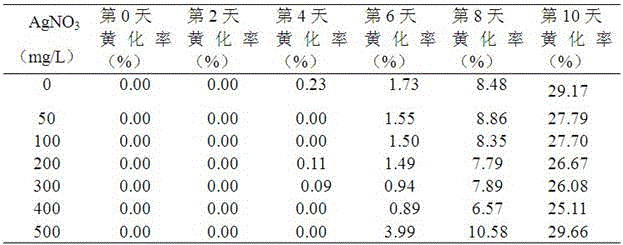A storage, transportation and fresh-keeping method of lotus lucky bamboo
A fresh-keeping method and a wealthy technology, which are applied in the preservation of plants, botanical equipment and methods, applications, etc., can solve the problems of high yellowing rate, large economic losses, and no storage, transportation and preservation of lucky bamboo, and reduce leaf yellowing. The effect of anti-aging, anti-aging, and beneficial to storage and transportation
- Summary
- Abstract
- Description
- Claims
- Application Information
AI Technical Summary
Problems solved by technology
Method used
Image
Examples
Embodiment 1
[0024] In this embodiment, the lotus lucky bamboo with 2 / 3 leaves removed from the bottom will be treated with AgNO 3 Store under ice conditions after treatment, set AgNO 3 The treatment concentrations were 50mg / L, 100mg / L, 200mg / L, 300mg / L, 400mg / L, 500mg / L, and distilled water was used as the control treatment, and the soaking treatment was 24h. The yellowing rate records are shown in Table 1. It can be seen from Table 1 that under ice storage conditions, the lotus bamboo with 2 / 3 leaves removed began to yellow on the 4th day of storage, and the earliest yellowing was 200mg / L and 300mg / LAgNO 3 In the treated experimental group, the yellow flower rate was 0.14% and 0.81% respectively, but the yellowing rate was extremely low, which was most likely caused by individual differences. Although it is possible to choose materials with the same growth as possible, it cannot be avoided. Yellowing due to inter-individual variation. Comparing the yellowing rate on the 10th day, it ca...
Embodiment 2
[0028] In this example, the leaves of the lotus lucky bamboo were treated with AgNO 3 Store under ice conditions after treatment, set AgNO 3 The treatment concentrations were 50mg / L, 100mg / L, 200mg / L, 300mg / L, 400mg / L, and 500mg / L, and distilled water was used as the control treatment, and the soaking treatment was 24 hours. The yellowing rate records are shown in Table 2. It can be seen from Table 2 that the control group and 50, 100, 500mg / L AgNO 3 Treated experimental groups appeared yellowing on the 6th day, treated with 200, 300, 400mg / LAgNO 3 Yellowing occurred on the 8th day of the treatment, but generally treated with a concentration of 100-400 mg / L AgNO 3 The yellowing rate of the treated experimental group ranged from 0.04-0.23% on the 6th day, and the yellowing rate was extremely low, which shows that the above-mentioned concentration has a relatively good fresh-keeping effect. On day 10, with 100-400 mg / L AgNO 3 Compared with the control group, the yellowing ra...
Embodiment 3
[0032] In this example, the leaves of the lotus lucky bamboo were treated with AgNO 3 Store under ice-free conditions after treatment, set AgNO 3 The treatment concentrations were 50mg / L, 100mg / L, 200mg / L, 300mg / L, 400mg / L, and 500mg / L, and distilled water was used as the control treatment, and the soaking treatment was 24 hours. The yellowing rate records are shown in Table 3. It can be seen from Table 3 that on the 10th day of the experiment, with 100-400 mg / L AgNO 3 Compared with the control group, the yellowing rate of the treated experimental group was reduced by 30.8-45.5%, indicating that AgNO 3 The treatment of lotus and lucky bamboo has the effect of significantly reducing the yellowing rate. Among them, at 300mg / L AgNO 3 It has the most obvious fresh-keeping effect when it is processed, and its yellowing rate is only 8.47%. With a high concentration of 500mg / L AgNO 3 The yellowing rate of the treatment was 16.09%, which was higher than that of the control group ...
PUM
 Login to View More
Login to View More Abstract
Description
Claims
Application Information
 Login to View More
Login to View More - R&D
- Intellectual Property
- Life Sciences
- Materials
- Tech Scout
- Unparalleled Data Quality
- Higher Quality Content
- 60% Fewer Hallucinations
Browse by: Latest US Patents, China's latest patents, Technical Efficacy Thesaurus, Application Domain, Technology Topic, Popular Technical Reports.
© 2025 PatSnap. All rights reserved.Legal|Privacy policy|Modern Slavery Act Transparency Statement|Sitemap|About US| Contact US: help@patsnap.com



